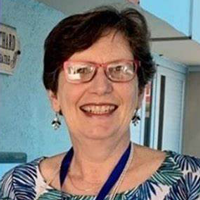ENE Research Seminar: Overcoming STEM Stereotypes
| Event Date: | February 20, 2025 |
|---|---|
| Speaker: | Felicity McLure, Ph.D. |
| Speaker Affiliation: | Charles Darwin University, Australia |
| Type: | Research Seminar |
| Time: | 3:30-4:20 p.m. |
| Location: | VIRTUAL ONLY |
| Open To: | Graduate and undergraduate students, staff, and faculty with an interest in educating engineers |
| Priority: | No |
| School or Program: | Engineering Education |
| College Calendar: | Show |
For the high-flex option, register in advance. You will receive a confirmation email containing information about joining the meeting.
ZOOM Meeting ID: 964 7802 2138
Passcode: enepurdue
Join the meeting
Title:
Overcoming STEM stereotypes: Are ill-structured problems that provide students with opportunities for agency in designing complex solutions a way forward?
Abstract:
Stereotypical views about the characteristics of who engages with STEM careers continue to be a major barrier to females in considering engineering or technology careers. We designed a STEM stereotypes questionnaire which revealed that Australian middle school students continue to believe that people working in STEM fields need to be geniuses, nerds, male and from wealthy, well educated families. Females are less likely than males to see themselves as highly competent in STEM fields and often do not want to be seen as ‘nerds’ or single-minded. Authentic, personally relevant engineering design projects have been suggested as one way forward to build self-efficacy in females and provide opportunities to understand the wide range of 21st century skills that are required for success in such projects. However, our research shows that very few middle-school STEM projects address students’ interests or give them opportunities for creativity and agency.
The wearable electronics project was designed to engage students in a creative, ill-structured STEM project that would engage students in creating a wearable product of their choice. Six classes from two schools participated (58 groups of 2-3 students) over 10 lessons. This project required many choices to be made and hence resulted in a high degree of complexity. Faced with this complexity, the groups could choose: early engagement with futures reasoning and simplification of their plans; persistence despite challenges they encountered; giving up early. Of the 58 teams, 46 (30 female, 15 male, 1 mixed) showed resilience despite challenges, while 12 (4 female, 7 male, 1 mixed) gave up. An emergent finding amongst female students was that opportunities to express creativity and agency in this project resulted in increased self-efficacy and a recognition that they may possess character traits and skills that could be valuable in STEM careers such as resilience, persistence, creativity, collaboration and growth mindset. Consequently, several students changed their attitudes towards a career in engineering.
Biography:
Dr. Felicity McLure is a senior lecturer (equivalent to associate professor in the US) in Science Education at Charles Darwin University, Alice Springs, Australia. She worked as head of science at schools in Australia and overseas before taking up a research position at Curtin University, Perth, Australia. She has published 30 articles in the fields of STEM learning environments and gender, conceptual change and multiple representations in science learning and whole school change. At present she has funding from the Northern Territory Government, Australia, to study ways in which to foster female STEM participation. This project also provides opportunities to co-design culturally relevant STEM projects in First nations communities of the Northern Territory.
Citations:
McLure, F. I., Tang, K-S. & Williams, P. J. (2022). What do integrated STEM projects look like in secondary school classrooms? A systematic literature review of empirical studies of iSTEM projects. International Journal of STEM Education, 9(73). https://doi/org/10.1186/s40594-022-00390-8
McLure, F. I., Fraser, B.J., Koul, R. (2022). Structural relationships between classroom emotional climate, teacher–student interpersonal relationships and students’ attitudes to STEM. Journal of Social Psychology of Education, 25(2-3), 625-648 https://doi.org/10.1007/s11218-022-09694-7
Tang, K-S., McLure, F. I., Williams, P.J. & Donnelly, C. (2024) Investigating the role of self-selected STEM projects in fostering student autonomy and self-directed learning. Australian Educational Researcher, 51(5), 2355-2379. https://doi.org/10.1007/s13384-024-00696-2

